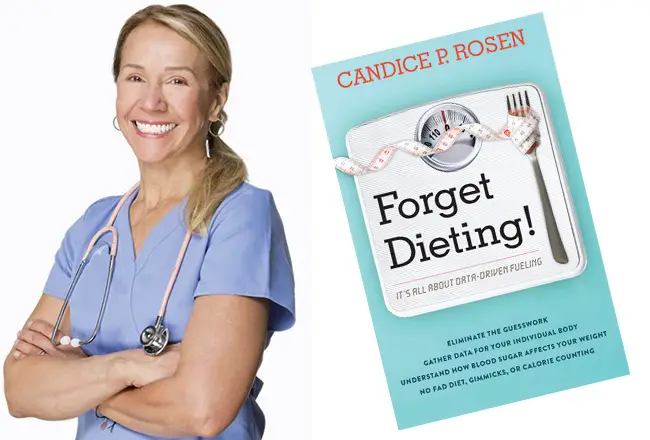Diet books are among the most ubiquitous titles in publishing, as well as being among the most confusing. With so many different routes to lose weight, one has to wonder why so many people never find their way to thinness.
Enter Candice P. Rosen, a registered nurse whose 2011 book “The Pancreatic Oath” detailed how poor food choices trigger pancreatic abuse that could result in chronic health issues. Rosen”™s new book, “Forget Dieting: It”™s All About Data-Driven Fueling!” ”” to be released in July by Rowman and Littlefield ”” takes a different look at wellness via trophology, also known as food combining.
As Rosen explains her new book, achieving weight loss and wellness via nutrition can be achieved if one approaches meals as an act of fueling instead of a diet protocol.
 “Your body is an organic machine,” she said. “It”™s all about understanding what fuel works for your body. Here”™s an example: A cardiologist will put cardiac patients on a diet by saying it is healthy for you to eat oatmeal for breakfast. Well, in over 75% of the clients that I have that are cardiac patients, if they eat oatmeal for breakfast their blood sugar skyrockets and it creates an inflammatory situation, which is highly unhealthy for cardiac patients. So, what I believe is in the practice of self-health where you”™re your primary caregiver and your physician is your secondary caregiver.”
“Your body is an organic machine,” she said. “It”™s all about understanding what fuel works for your body. Here”™s an example: A cardiologist will put cardiac patients on a diet by saying it is healthy for you to eat oatmeal for breakfast. Well, in over 75% of the clients that I have that are cardiac patients, if they eat oatmeal for breakfast their blood sugar skyrockets and it creates an inflammatory situation, which is highly unhealthy for cardiac patients. So, what I believe is in the practice of self-health where you”™re your primary caregiver and your physician is your secondary caregiver.”
In her book, Rosen calls for specific omissions and additions to a person”™s meal plan. One key omission that she recommends is the exclusion of dairy products.
“Dairy is highly inflammatory,” she said. “It also contains IGF-1 or insulin growth factor one and it”™s really not necessary. You know, most animals are weaned at a certain age, right? Cows, pigs, lions, tigers ”” they”™re not eating dairy for the rest of their lives. It”™s just unhealthy. And also, milk is acidic in the gut and your body”™s hard wired to survive. What happens is that when you have that dairy in your gut, you have to buffer that and one of the buffering agents is calcium. Your body actually extracts calcium from your bones in order to buffer that.”
Rosen noted that the U.S. has the highest rate of osteoporosis and fractures in the world, which she blames on dairy products.
“We consume a lot of dairy,” she said, noting the belief that dairy is a bone-strengthening agent is wrong. “Yogurt and cheese and things like that actually weaken your bones, so you”™re better off with dark leafy greens like kale in order to provide calcium.”
Rosen”™s new book also calls for Wednesdays and Fridays to be set aside as vegan meal days, which she explained was essential in providing the nutritional fuel needed to achieve wellness by giving “your organic machine a break from processing animal proteins ”” focusing on a plant-based protein diet for those two days is not going to hurt you.”
She added that devoting two days a week to vegan meals will also help “take factory farming down a bit, so hopefully there”™ll be less of that and, of course, will improve the planet.”
One might imagine that fruits would be a key factor in the fueling advocated by Rosen”™s new book, but she insisted that fruit should be eaten alone except with a vegan smoothie or with a nut and seed butter.
“All fruit combined with other things ferments in your stomach,” she said. “Hold on to that fruit, wait 90 minutes after you eat and then have the fruit. Those two exceptions are for a lot of people for whom eating fruit alone will really spike their blood glucose. When you add a healthy fat-like nut butter, it slows down the digestion and you don”™t have a rapid spike in blood sugar.”
Rosen advocated the inclusion of sweet potatoes over white potatoes because the former is “higher in fiber and Vitamin A.” She acknowledged not having a problem with white potatoes, but lamented that people “add butter, sour cream, bacon bits or whatever” to the item and dilute its value as a healthy dietary staple. She also cringed at the acceptance of burgers and fries as an American diet staple.
“You don”™t want to combine an animal protein with any starchy carb,” she said, adding that she was realizes that sometimes people don”™t have a choice of healthy meal selections.
“I”™ll tell my clients if they”™re at an airport or they”™re on the run and they want a burger to please take off the top bun and ask for extra lettuce on top.”
The COVID-19 pandemic placed a new emphasis on meal planning and wellness, especially since gyms have been closed for months and a greater emphasis on ordering takeout meals from financially struggling eateries has been stressed in the media. But Rosen is not buying the notion that following pandemic edicts on sheltering at home were a good excuse for straying from a healthy wellness regimen.
“No, it”™s a really terrible excuse because it actually afforded you an opportunity to finally get your health in order,” she said. “And I think that the one thing that we don”™t understand on a global level: they can make 1,000 vaccines, but it”™s not going to do you any good unless your organic machine is in the proper working condition. If you think about your body battling hypertension or type 2 diabetes and you get exposed to COVID-19 or any other virus that is going to come along down the path or a germ or a bacteria ”” if it”™s not in the best working condition and it has to battle these other illnesses, you”™re going to be sick.
“If you look at COVID-19,” she continued, “the majority of deaths occurred in the elderly and people with pre-existing conditions, right? High blood pressure, obesity, diabetes ”” what is not being said is that those elderly people are not just old, but they also have pre-existing conditions. Another reason why people died from COVID is that there wasn”™t a standard of care ”” there were a lot of different hospitals treating the condition differently in a mishmash of treatment. But the one thing that COVID-19 should showcase is that you have to be in the best health in order to handle anything that”™s thrown your way.”



















